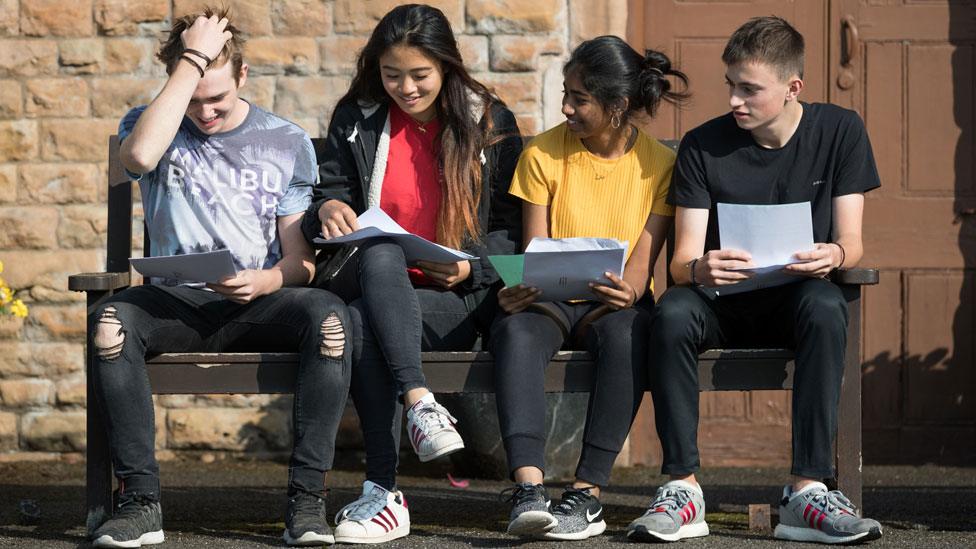A-level and GCSE results to be higher this summer
- Published

GCSE and A-level results in England will be higher this summer, with exam boards set to be more lenient.
Written exams were cancelled because of the pandemic - with pupils' results to be based on predicted outcomes.
The watchdog Ofqual says the numbers getting good grades will be 2% higher at A-level and 1% at GCSE.
But they will be much lower than the "optimistic" predictions from teachers, which at A-level would have pushed up results 12% higher than last year.
The exam regulator says it is also confident, from preliminary results, that there has been no "unconscious bias" in predicted grades that would have disadvantaged ethnic minorities or poorer students.
A report from the education select committee this month warned of the risk that some pupils could be discriminated against.
But Ofqual says there is no evidence of any widening gaps in this summer's results, in terms of ethnicity, gender or deprivation, compared with years when pupils have taken exams.
While individual pupils will not find out their GCSEs and A-levels until next month, the process of standardising these predicted grades means that the overall national picture is already emerging.
The exam regulator says this will be a more generous year, with candidates more likely to be given the benefit of the doubt.
So for instance, last summer 25.5% of candidates achieved an A grade or above at A-level - and this year it will be more like 27.5%.
There have been no GCSEs or A-levels this year - with results to be based on estimated grades
Ofqual says to expect variations in terms of subject and grades - but overall results will be "slightly better" than the previous year.
But teachers, who had to submit predicted grades, would have been much more generous and the exam boards have had to bump down the grades much closer to last year's.
At A-level, the predictions for A grades would have pushed up results by 12.3 percentage points - if they had not been knocked back down by the exam boards.
For GCSE, results would have jumped upwards by 9 percentage points, based on teachers' predictions.
The grades to be given to pupils will be based on a range of evidence - including their previous exam results, the distribution of grades in the school in recent years, how schools ranked their pupils in expected outcomes, as well as their teachers' predictions.
But because grades will be linked to schools' performance in previous years, schools that have been rapidly improving will not necessarily see that in this year's results.
If pupils are not happy with their results based on predictions, they will be able to take written exams in the autumn.
Nansi Ellis of the National Education Union welcomed the "commitment to equalities" in the results so far, in terms of the risk of bias - and that "there appear to be no obvious differences between the grades of different groups of students".
Paul Whiteman of the National Association of Head Teachers backed the replacement grades, saying "while not a perfect solution, this is the fairest and most pragmatic alternative to sitting exams".